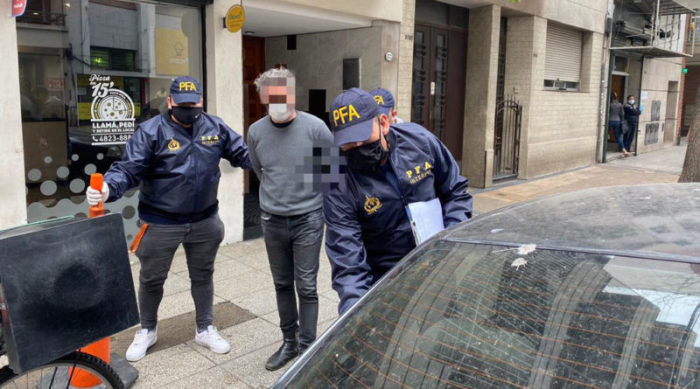WSi News2020-07-24 11:01:04
Six fugitives arrested in I-CAN global anti-mafia operation
Coordination through the INTERPOL Cooperation Against ‘Ndrangheta (I-CAN) project – an INTERPOL and Italian initiative – has seen law enforcement round up six fugitives in Albania, Argentina and Costa Rica following intelligence gained in an earlier operation targeting the ‘Ndrangheta in November 2019.
Last year’s “Operation Magma 2007” targeted individuals wanted for association with the ‘Ndrangheta, as well as drug trafficking and illegal weapons possession. Conducted by Italy’s Guardia di Finanza and Direzione Centrale Servizi Antidroga, and coordinated by the Direzione Distrettuale Antimafia in Reggio Calabria, the operation resulted in the arrest of 45 suspects across Italy.
The search for the ‘Ndrangheta fugitives linked to those arrested in Operation Magma 2007 was led by Italy’s Central Directorate of the Criminal Police using INTERPOL channels enhanced under the I-CAN project. This enabled the rapid exchange of intelligence between Italy’s specialized anti-mafia police units and law enforcement in the involved countries.
400 kg of cocaine and a ‘Ndrangheta clan dismantled
On 21 July, three of the fugitives were arrested in Buenos Aires while a simultaneous operation in Tirana, Albania led to the capture of a fourth ‘Ndrangheta-linked fugitive.
The next day, a fifth fugitive was arrested in Costa Rica.
A sixth fugitive who had avoided capture in Operation Magma 2007 was arrested in Albania last May.
On top of the arrests, the combined operations netted 400 kg of cocaine, 30 kg of hashish, 15 kg of marijuana, an automatic assault rifle, three semiautomatic pistols, a silencer and ammunition of various calibers.
The operations and ensuing investigations enabled police to completely dismantle the ‘Bellocco’ ‘Ndrangheta family clan in Rosarno (Reggio Calabria) along with its regional branches, arresting all top members of the family operating across Italy.
Endowed with considerable financial resources, the Bellocco clan was involved in importing South American cocaine by boat into Italy, particularly from Argentina and Costa Rica. For this, the group depended on emissaries that travelled frequently between the Bellocco clan’s Calabrian base and supplier countries. These emissaries were the target of this week’s follow-up operation.
Silently polluting the global economy
“This operation is a testament to the need for a global approach to the widespread criminal activities of the ‘Ndrangheta and showcases the level of international police cooperation, facilities and INTERPOL support that can be achieved thanks to the I-CAN project,” said Prefect Rizzi, Deputy Director General of Public Security Deputy Director General of Public Security at Italy’s Central Directorate of the Criminal Police.
“The ‘Ndrangheta represents a threat that has silently polluted the economy of more than 30 countries around the world. The only way it can be countered is through a more powerful global network,” Prefect Rizzi added.
“These arrests saw specific fugitives, more than 10,000 km apart, simultaneously captured by Albanian, Argentine and Costa Rican police in a coordinated operation” said INTERPOL Secretary General Jürgen Stock.
‘This impressive result under our I-CAN project again demonstrates the operational relevance of INTERPOL’s global police capabilities and the critical importance of international police cooperation.
“I congratulate the Italian Central Directorate of the Criminal Police and applaud all the police units involved in this impressive operation, which will no doubt be the first of many” concluded the INTERPOL Chief.
“We are determined to bring all ‘Ndrangheta suspects to justice, including those who attempt to escape law enforcement by fleeing abroad,” said Chief Prosecutor of Reggio Calabria Giovanni Bombardieri.
‘These results vindicate that strategy and testify to our commitment to rooting out organized crime groups wherever they spread.”
Coordinated by the Argentine Procuraduría de Narcocriminalidad, the INTERPOL National Central Bureau (NCB) in Buenos Aires, the Argentine Federal Police and the Argentine National Gendarmerie supported the following arrests in Buenos Aires:
Ferdinando Sarago, a courier and trusted associate of the 'Ndrangheta, who moved between South America and Calabria. The ‘Ndrangheta turned to Sarago for various operational needs and to transport secret documents. He met Carmelo Aglioti (one of the 45 suspects arrested in November) in Argentina on a trip aimed at resolving a failure to import drugs on behalf of the Pesce and Bellocco families, both part of the ‘Ndrangheta.
Giovanni Di Pietro, also known as Massimo Pertini, residing in Buenos Aires, acted as a key broker in dealings between the Italian ‘Ndrangheta gangs and South American drug suppliers. In 1978, he was involved in the kidnapping of Franz Trovato, the son of a local industrialist in Acireale, Italy, which ended in the boy’s death after he tried to escape following 21 days of imprisonment.
Fabio Pompetti, an Argentine national who, due to his local network of relationships, was able to circumvent anti-money laundering systems and avoid customs controls. For years, he worked as a representative for South American drug suppliers to the 'Ndrangheta.
In Albania, the State Police, supported by the INTERPOL NCB in Tirana, coordinated the arrest of Bujar Sejdinaj, referred to as "The Uncle". As part of the 'Ndrangheta’s – and particularly the Bellocco family’s – outpost in the Balkans, Sejdinaj participated in the purchase of approximately 20 kg of cocaine in Spain.
The fifth Operation Magma 2007 fugitive, Adrian Cekini, was arrested in Elbasan, Albania on 26 May.
Members of the INTERPOL NCB in San Jose arrested Franco D'Agapiti on 22 July in Jacó. Born in Rome, D’Agapiti co-owned the Hotel Casino Amapola in San Josè, suspected of settling in the country to serve as a representative of the Bellocco clan. His alleged role was to facilitate the entry of cocaine into Italy, utilizing his overseas network and hotel to provide logistical support to visiting people of the clan ('Ndranghetisti).
The 11 pilot countries in the I-CAN project are: Australia, Argentina, Brazil, Canada, Colombia, France, Germany, Italy, Switzerland, United States and Uruguay.
For more information contact:
